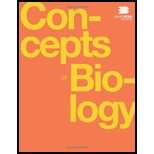
Concept explainers
Figure 4.6 Look at each of the processes shown and decide if it is endergonic or exergonic.
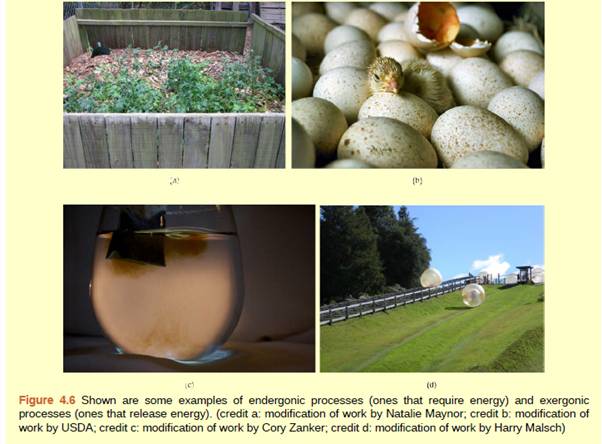
To analyze:
The process shown in the figure is endergonic or exergonic.
Introduction:
The endergonic process is the one which is accompanied by the absorption of energy from the surrounding, while exergonic processes is accompanied by the release of energy into the environment.
Explanation of Solution
Given:
Figure (a) 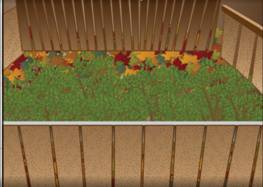
Figure (b) 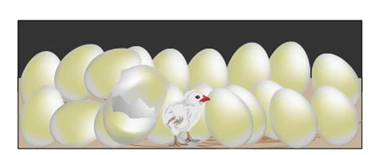
Figure (c) 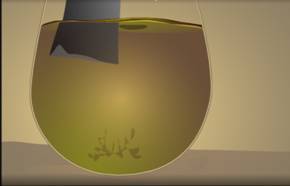
Figure (d) 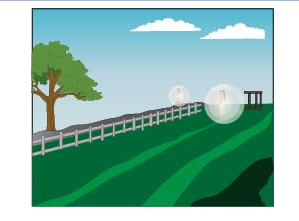
The first figure is of a compost. Decomposition of dead and decaying matter to produce compost or humus is an exergonic process because it is accompanied by the release of heat energy.
The second picture is of a chick coming out from an egg. It is an endergonic process because the process has taken in the energy from the chick.
The third picture is of tea dissolving in water, which is an exergonic process.
The last one is of a ball rolling downwards, in this case, the energy is dissipiated in the environment, which is an exothermic or exergonic process.
Decomposition, dissolving of tea in water and rolling of the ball are exergonic reactions, while the hatching of a chick from an egg is an example of an endergonic reaction.
Want to see more full solutions like this?
Chapter 4 Solutions
Concepts of Biology
Additional Science Textbook Solutions
Biological Science (6th Edition)
Human Anatomy & Physiology (2nd Edition)
Microbiology with Diseases by Body System (5th Edition)
Human Physiology: An Integrated Approach (8th Edition)
Concepts of Genetics (12th Edition)
Biology: Life on Earth (11th Edition)
- In one paragraph show how atoms and they're structure are related to the structure of dna and proteins. Talk about what atoms are. what they're made of, why chemical bonding is important to DNA?arrow_forwardWhat are the structure and properties of atoms and chemical bonds (especially how they relate to DNA and proteins).arrow_forwardThe Sentinel Cell: Nature’s Answer to Cancer?arrow_forward
- Molecular Biology Question You are working to characterize a novel protein in mice. Analysis shows that high levels of the primary transcript that codes for this protein are found in tissue from the brain, muscle, liver, and pancreas. However, an antibody that recognizes the C-terminal portion of the protein indicates that the protein is present in brain, muscle, and liver, but not in the pancreas. What is the most likely explanation for this result?arrow_forwardMolecular Biology Explain/discuss how “slow stop” and “quick/fast stop” mutants wereused to identify different protein involved in DNA replication in E. coli.arrow_forwardMolecular Biology Question A gene that codes for a protein was removed from a eukaryotic cell and inserted into a prokaryotic cell. Although the gene was successfully transcribed and translated, it produced a different protein than it produced in the eukaryotic cell. What is the most likely explanation?arrow_forward
- Molecular Biology LIST three characteristics of origins of replicationarrow_forwardMolecular Biology Question Please help. Thank you For E coli DNA polymerase III, give the structure and function of the b-clamp sub-complex. Describe how the structure of this sub-complex is important for it’s function.arrow_forwardMolecular Biology LIST three characteristics of DNA Polymerasesarrow_forward
 Principles Of Radiographic Imaging: An Art And A ...Health & NutritionISBN:9781337711067Author:Richard R. Carlton, Arlene M. Adler, Vesna BalacPublisher:Cengage LearningCase Studies In Health Information ManagementBiologyISBN:9781337676908Author:SCHNERINGPublisher:Cengage
Principles Of Radiographic Imaging: An Art And A ...Health & NutritionISBN:9781337711067Author:Richard R. Carlton, Arlene M. Adler, Vesna BalacPublisher:Cengage LearningCase Studies In Health Information ManagementBiologyISBN:9781337676908Author:SCHNERINGPublisher:Cengage Human Physiology: From Cells to Systems (MindTap ...BiologyISBN:9781285866932Author:Lauralee SherwoodPublisher:Cengage Learning
Human Physiology: From Cells to Systems (MindTap ...BiologyISBN:9781285866932Author:Lauralee SherwoodPublisher:Cengage Learning





